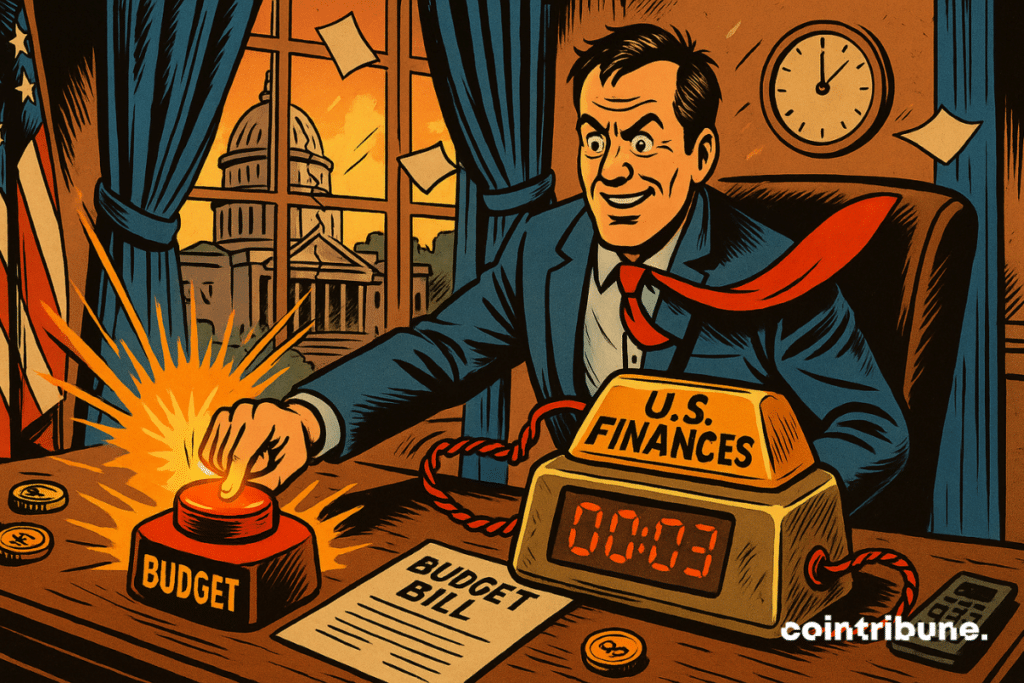Trump's Budget Bill Could Ruin US Finances!
As markets scrutinize every move by the Fed and the US public debt hits new records, Donald Trump is reviving a large tax project. His proposal is to extend and amplify the tax cuts of 2017. While his supporters see it as a growth lever, economists fear a massive budgetary drift. This text, nicknamed “One Big Beautiful Bill”, crystallizes the tensions between political ambition and financial viability.

In Brief
- Donald Trump is reviving an ambitious tax reform aimed at extending and expanding the tax cuts from his first term.
- According to the Congressional Budget Office (CBO), this ‘big and beautiful bill’ could increase the federal debt by $2.4 trillion by 2034.
- The government defends the reform, assuring that it will reduce the deficit by $1.6 trillion through savings and increased customs revenues.
- In the medium term, this reform could have profound consequences on US budgetary balances and crypto market dynamics.
A Controversial Tax Reform: The Numbers and Initial Tensions
As tensions rise between Trump and Musk around the budget bill, the Congressional Budget Office (CBO) published on June 5 an assessment that immediately inflamed the economic debate in Washington.
According to this independent body attached to Congress, the tax bill proposed by Donald Trump, presented as an extension of his first term tax cut policy, could worsen the public debt by $2.4 trillion by 2034.
The text provides for the continuation but also the expansion of several tax reductions, as well as cuts in social programs. “We’re preparing your tax cuts”, proclaims the White House on its official site, illustrated with a solemn photo of the president.
The project, already passed by the House of Representatives, now awaits a decisive vote in the Senate, hoped for by the executive by July 4.
These announcements come in a particularly tense budgetary climate, aggravated by Moody’s downgrade of the US credit rating, which removed the triple A in May. The federal debt now reaches $37 trillion, a record level.
The CBO, while highlighting the potential inflationary effect of the text, detailed the quantified impacts of the reform:
- +$2.4 trillion on the federal debt by 2034, due to the new tax cuts;
- $1.2 trillion in planned spending cuts over ten years;
- $1.6 trillion in “mandatory savings” proposed by the administration to partially offset costs;
- Significant cuts to Medicaid, likely affecting several million beneficiaries;
- Increased pressure on bond markets, especially on long-term securities.
These data are subject to divergent interpretations. The White House claims the reform would provide a historic deficit reduction, while CBO experts warn of an unsustainable debt dynamic. Between divergent projections and institutional tensions, the fault line is now clearly visible.
Internal Divides and Sharp Criticism: The Trump Camp Fractures
Beyond economic estimates, the bill divides even within the Republican camp. Several conservative lawmakers have publicly expressed their reservations about the scale of the deficit this reform could generate.
“I refuse to accept deficits over $2 trillion as the new norm”, said Republican Senator from Wisconsin, Ron Johnson, on ABC News. For him, this text compromises the fiscal discipline traditionally claimed by the party.
These dissenting voices also point to Medicaid cuts, which could deprive millions of Americans of their health coverage, a politically sensitive issue.
The rebellion does not only come from the Senate. Elon Musk, until now close to the president and involved in the Department of Government Efficiency (DOGE), a task force aiming to reduce public spending by $1 trillion, has violently criticized the project.
He called it a “huge, scandalous, and clientelistic budget bill”, even speaking of “repugnant abomination”. At the same time, Stephen Miller, a senior White House official, attempted to discredit the CBO by calling it a “left-wing” organization and challenged the methodology used in its projections.
In the short term, this climate of uncertainty could affect investor confidence in US Treasury bonds like Beijing easing off on them, which would increase pressure on the dollar and interest rates. In the longer term, if the reform were adopted as is, it could pave the way for a new era of structural indebtedness in the United States, with potential contagion effects on international markets, including crypto, which often react to distrust in traditional monetary policies.
Maximize your Cointribune experience with our "Read to Earn" program! For every article you read, earn points and access exclusive rewards. Sign up now and start earning benefits.
Diplômé de Sciences Po Toulouse et titulaire d'une certification consultant blockchain délivrée par Alyra, j'ai rejoint l'aventure Cointribune en 2019. Convaincu du potentiel de la blockchain pour transformer de nombreux secteurs de l'économie, j'ai pris l'engagement de sensibiliser et d'informer le grand public sur cet écosystème en constante évolution. Mon objectif est de permettre à chacun de mieux comprendre la blockchain et de saisir les opportunités qu'elle offre. Je m'efforce chaque jour de fournir une analyse objective de l'actualité, de décrypter les tendances du marché, de relayer les dernières innovations technologiques et de mettre en perspective les enjeux économiques et sociétaux de cette révolution en marche.
The views, thoughts, and opinions expressed in this article belong solely to the author, and should not be taken as investment advice. Do your own research before taking any investment decisions.